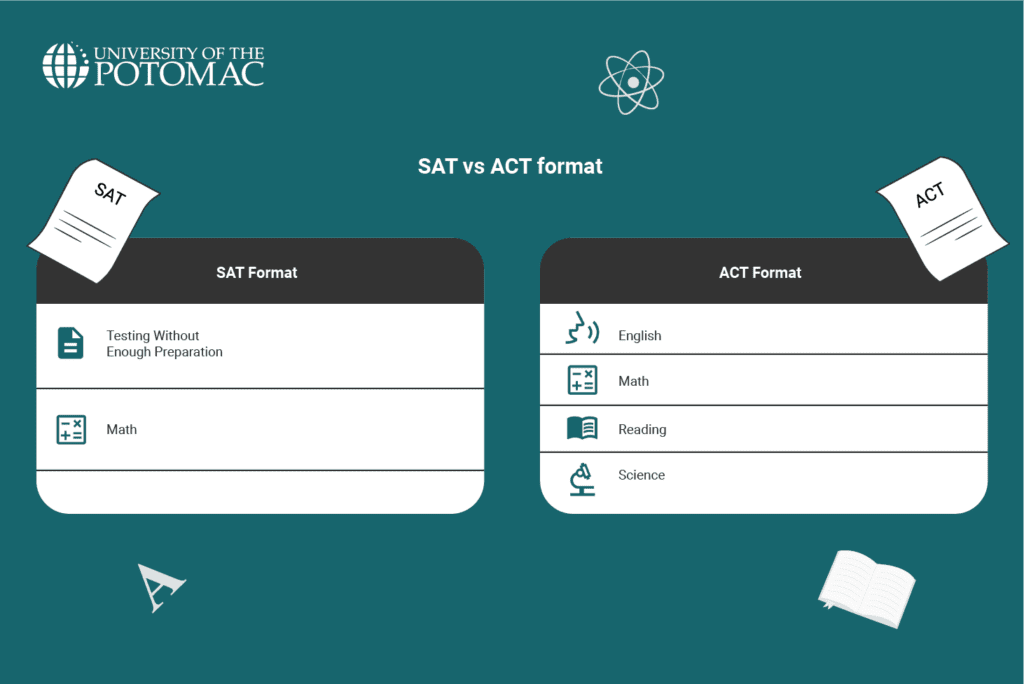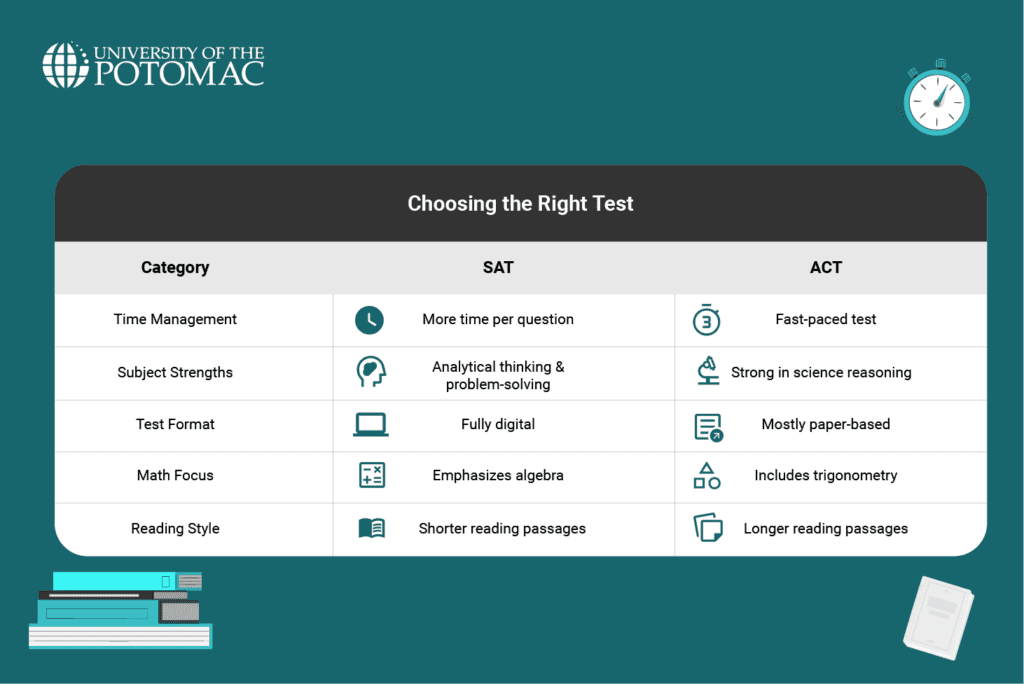- Test Structure Differences: The SAT focuses on reading, writing, and math, while the ACT includes English, math, reading, and science.
- Timing and Pacing: The SAT allows more time per question, while the ACT is faster-paced and may suit students who work well under pressure.
- Test Format: The SAT is fully digital with adaptive testing, whereas the ACT is primarily paper-based with an optional science section.
- Preparation Resources: Both tests offer a range of free and paid prep options, with some differences in cost and availability of resources.
If you’re a student looking to pursue a college education, chances are you are still trying to decide between taking the SAT or the ACT. Colleges accept either of them, which means it is up to you to choose which one you will pursue.
But before you decide which test to take, you need to consider its format, content, and pacing and compare how these factors align with your strengths, learning style, and college goals.
So to help you determine the SAT vs ACT battle, we will outline the key differences between the two.
What Is the SAT?
The Scholastic Assessment Test, or SAT, is used by colleges across the United States to determine how prepared their students are for college. It measures critical thinking, problem-solving, and information analysis, among other important skills.
The SAT assesses comprehension and application of knowledge through two components:
- Math
- Reading and writing
In 2024, the SAT switched to a digital format, which has made it easier and more flexible for students to take. The digital format of the SAT is shorter (lasts two hours instead of three) and uses adaptive testing, i.e., the questions change based on how well you’re doing.
This updated version focuses more on thinking skills by using shorter reading passages and practical math problems. This modern, digital approach may appeal to you if you are more tech-savvy.
What Is the ACT?
The ACT, or American College Testing, is another test used by colleges in the US to assess students on their readiness for college. This test helps measure important skills students need to succeed in higher education.
Contrary to the SAT, the ACT test students capacities through four modules:
- English
- Math
- Reading
- Science
- Writing (optional)
Unlike the SAT, the ACT is still mostly taken on paper, although some schools might offer a digital version. In 2025, the science section of the ACT will become optional and focus more on how students analyze and understand scientific information.
Key Differences Between SAT and ACT
The two main differences between the SAT and ACT are their structure and focus. The SAT has two sections: reading and writing and math, and it focuses more on critical thinking and analytical skills.
On the other hand, the ACT has additional sections on English and science, with the writing section being optional. The focus of the ACT is on scientific reasoning and problem-solving.
Other differences between the two tests include their formats, timing, evaluation methods, and the available preparation resources and costs. We’ll explore them in more detail below.
SAT vs ACT format

The SAT and ACT each have their distinct formats that cater to different student preferences.
As we discussed above, the SAT has two main sections:
- Reading and Writing: This section combines comprehension and grammar and has 54 questions based on short passages.
- Math: This section focuses on algebra, problem-solving, and advanced math topics. It has 44 questions, split between multiple-choice and grid-ins.
Alternatively, the ACT includes four sections:
- English: Tests grammar and rhetorical skills with 75 questions in 45 minutes.
- Math: Covers a broader range of topics, including geometry and trigonometry, with 60 questions in 60 minutes.
- Reading: Evaluates comprehension with longer passages and 40 questions in 35 minutes.
- Science: Unique to the ACT, this section focuses on interpreting scientific data. It has 40 questions and takes 35 minutes to complete.
ACT also has writing as an optional section. Through this section, ACT assesses analytical and argumentative writing skills by requiring students to evaluate multiple perspectives on an issue and present their own viewpoint in a 40-minute essay.
SAT vs ACT timing
Another key difference between the SAT and ACT is timing. With the SAT, you’ll feel less rushed as it allows more time for each question. You will have around 2 hours and 14 minutes (not counting breaks) to complete the SAT
The time is divided between sections based on the number and nature of questions:
- Reading and Writing: 64 minutes for 54 questions, so you’ll have a little over a minute to answer each question.
- Math: 70 minutes for 44 questions to give you more time for calculations and problem-solving.
On the other hand, ACT has a more fast-paced structure, forcing you to manage your time effectively. During ACT, you have about 2 hours and 55 minutes (excluding breaks) to complete the test.
The time is divided between sections as such:
- English: 45 minutes for 75 questions, giving you 36 seconds per question.
- Math: 60 minutes for 60 questions, giving you 1 minute per question.
- Reading: 35 minutes for 40 questions, giving you just under a minute per question.
- Science: 35 minutes for 40 questions, which gives you less than a minute per question.
The ACT may be better suited for you if you can work quickly and stay focused under time pressure.
Evaluation

The SAT and ACT also differ in their scoring systems and how they evaluate students.
The SAT is scored on a scale of 400 to 1600, which includes:
- Reading and Writing: Scored from 200 to 800.
- Math: Scored from 200 to 800.
A good SAT composite score is anywhere from 1200 to 1400, while a score above 1400 is excellent and competitive for top colleges.
Alternatively, the ACT is scored on a scale of 1 to 36, based on the average of the four sections (English, Math, Reading, and Science) scores, each scored from 1 to 36.
The optional Writing section is scored separately on a scale of 2 to 12 and does not impact the composite score. An ACT composite score of 25 or higher is considered good, while a score of 30 or above is excellent.
The following table shows how SAT scores convert to ACT scores:

Preparation resources and cost
The SAT and ACT offer a range of free and paid resources to help you prepare for the test.
Interested in pursuing a degree?
Fill out the form and get all admission information you need regarding your chosen program.
This will only take a moment.
Message Received!
Thank you for reaching out to us. We will review your message and get right back to you within 24 hours.
If there is an urgent matter and you need to speak to someone immediately you can call at the following phone number:
- We value your privacy.
If you are taking the SAT, you can access free practice tests and personalized study plans through Khan Academy. Additional tools, like sample questions and tips, are available online.
Alternatively, if you are willing to chip in some bucks in the process, you can find a plethora of test prep books, online courses, and private tutoring ranging from $20 to $1,000+.
If you are planning to take ACT, ACT.org offers free sample questions, a full practice test, and downloadable guides. Alternatively, depending on the program, ACT Online Prep and private tutoring cost between $30 and $1,500+.
The cost fee for the tests are:
- SAT: $60 with four free score reports; any additional reports cost $12 each.
- ACT: $68 (with Writing) or $51 (without Writing); extra score reports cost $18 each.
Choosing the Right Test

When choosing between the SAT and ACT, it’s essential to consider your strengths, preferences, and learning style.
If you get easily anxious, pick the SAT as it offers more time per question. On the other hand, if you work well under pressure and like a fast-paced test, then go for the ACT.
Another key element to consider is the test format that you are more comfortable with. If you consider yourself tech-savvy, go for the SAT’s digital format. However, if you’re more for traditional testing choose the ACT’s for its paper-based structure.
You should also consider your subject strengths. For example, if analytical thinking and problem-solving are your strong suit, then the SAT is the ideal test for you. Alternatively, choose the ACT if you have a knack for science because it offers a separate science section.
Here, you should also consider what math you want to focus. If you’d like to focus more on algebra, pick the SAT; if you’re good at geometry and trigonometry, then go for the ACT.
Similarly, you need to determine the reading style that matches you. If you are not particularly good with lengthy texts, you may want to go with the SAT, as it uses shorter passages (contrary to ACT which has longer passages).
SAT and ACT Test Schedules
Both the SAT and ACT are offered several times throughout the year.
The SAT is typically offered in March, May, June, August, October, November, and December. Exact dates may vary yearly, and you can find the official schedule and register through the College Board website.
On the other hand, the ACT is offered in February, April, June, July, September, October, and December. More details and registration options are available at ACT.org.
To ensure a smooth test day experience, you should have the following ready:
- A valid photo ID (e.g., passport or driver’s license).
- The admission ticket for their registered test.
- Approved calculators (for the math sections).
- Several #2 pencils (mechanical pencils are not allowed).
- Snacks and water for breaks.
Conclusion
Choosing the right test, whether it’s the SAT or ACT, plays a significant role in your academic success and college application process. It’s important to consider your strengths in areas like math, reading, and science, as well as your personal preferences for pacing and test format.
Colleges generally accept both tests equally, so understanding the unique structure of each and how it aligns with your abilities is key. To make an informed decision, try taking practice tests for both the SAT and ACT, which will give you a clearer sense of which test suits you best and allows you to perform at your highest potential.
Frequently Asked Questions
Do colleges prefer ACT or SAT?
Colleges do not prefer one over the other; both are equally accepted.
Should I take the SAT or ACT if I’m bad at math?
The SAT may be better, as it allows a calculator on some math questions and focuses more on algebra, while the ACT includes advanced topics like geometry and trigonometry.
How many times can you take the ACT and the SAT?
You can take both ACT and SAT tests as many times as you want, though most students take them 2-3 times for optimal scores.










